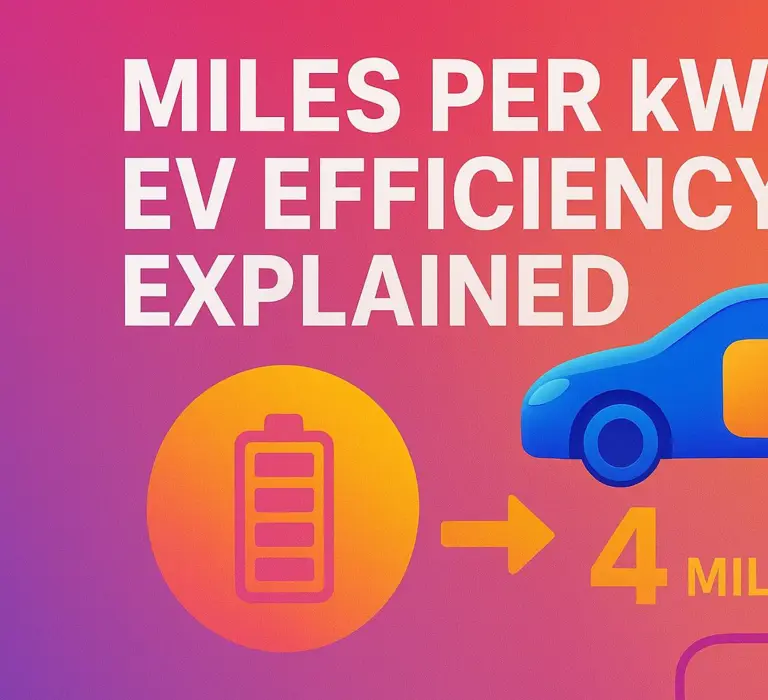When choosing or running an electric car, one of the most important efficiency metrics is miles per kWh (kilowatt-hour). Similar to miles per gallon (MPG) in petrol or diesel cars, miles per kWh shows how far your EV can travel on a single unit of electricity.
For UK drivers, this figure is crucial because it affects running costs, charging frequency, and overall value of an EV. In this guide, we’ll explain what miles per kWh means, how to calculate it, what counts as a good figure, and which electric cars perform best in 2025.
What Does Miles per kWh Mean?
Miles per kWh measures how efficiently an electric car uses energy:
-
1 kWh of electricity = the amount of energy it takes to power a 1,000-watt appliance for one hour.
-
If an EV achieves 4 miles per kWh, it means it can travel four miles using just one unit of electricity.
Think of it as the EV equivalent of MPG – higher miles per kWh means better efficiency and lower running costs.
Miles per kWh vs kWh per 100 Miles
Some manufacturers also display kWh per 100 miles (similar to litres per 100 km in petrol cars).
-
Miles per kWh (UK preferred): Higher is better.
-
kWh per 100 miles (EU metric): Lower is better.
Example:
-
An EV that achieves 4 mi/kWh = 25 kWh per 100 miles.
-
Same data, just reversed.
How to Calculate Miles per kWh
The formula is simple:
Miles Driven ÷ kWh Used = Miles per kWh
Example:
-
You drive 150 miles using 50 kWh of energy.
-
150 ÷ 50 = 3 mi/kWh.
Many drivers use a miles per kWh calculator (built into EV dashboards or apps) for quick tracking.
Average Miles per kWh for UK Electric Cars (2025)
On UK roads, most EVs achieve between 3–4 mi/kWh in real-world driving. Smaller, aerodynamic EVs can push above 5 mi/kWh.
|
EV Model (2025) |
Average Miles per kWh |
Real-World Range (approx.) |
|---|---|---|
|
Tesla Model 3 (RWD) |
4.2–4.5 |
~280 miles |
|
Hyundai Ioniq 6 |
4.5–5.0 |
~300 miles |
|
Kia EV6 |
3.5–4.0 |
~270 miles |
|
VW ID.3 |
3.8–4.2 |
~250 miles |
|
MG4 EV |
4.0–4.5 |
~260 miles |
|
Nissan Leaf (2025) |
3.2–3.6 |
~200 miles |
On average, UK EVs achieve 3–4 mi/kWh, while 5+ mi/kWh is considered highly efficient.
Real-World vs WLTP Efficiency
Manufacturers quote WLTP efficiency figures, but real-world results vary due to:
-
Driving style
-
Road conditions
-
Temperature (cold weather reduces range by 15–25%)
-
Use of heating/air conditioning
Always expect real-world efficiency to be slightly lower than lab-tested WLTP claims.
Which EVs Have the Best Miles per kWh in 2025?
Here are the Top 5 most efficient EVs in the UK (2025):
-
Hyundai Ioniq 6 – Up to 5 mi/kWh
-
Tesla Model 3 RWD – ~4.5 mi/kWh
-
MG4 EV – ~4.3 mi/kWh
-
VW ID.3 – ~4.1 mi/kWh
-
BMW i4 eDrive40 – ~4.0 mi/kWh
These models stand out for their aerodynamics, efficient motors, and lightweight design.
What Is a Good Miles per kWh?
-
3 mi/kWh → Typical for larger EVs and SUVs
-
4 mi/kWh → Good, average for mid-sized EVs
-
5 mi/kWh+ → Excellent, found in the most efficient EVs
If your EV achieves 4+ mi/kWh in the UK, you’re running at a very efficient level.
How Miles per kWh Affects Running Costs
Electricity in the UK (2025) averages £0.25 per kWh at home.
Example:
-
EV efficiency = 4 mi/kWh
-
Cost per mile = £0.25 ÷ 4 = £0.06 per mile
By comparison:
-
Petrol car (40 mpg, £1.50/litre) costs around £0.15 per mile.
This shows why EVs remain far cheaper per mile than petrol or diesel.
You can also try our Fuel Cost Calculator UK to compare your EV costs against petrol and diesel cars.
How to Improve Your Miles per kWh
-
Drive smoothly: Avoid harsh acceleration and braking.
-
Maintain tyre pressure: Underinflated tyres reduce efficiency.
-
Limit excess weight: Remove unnecessary items from the boot.
-
Optimise heating/cooling: Pre-condition the car while plugged in.
-
Charge smartly: Charging at home is usually cheaper and more efficient.
-
Account for seasons: Cold weather can reduce efficiency by up to 25%.
Final Words
Understanding miles per kWh helps UK drivers choose the right EV and manage running costs effectively. Whether you’re comparing models, exploring car leasing options, or looking to improve efficiency, this metric is the EV world’s equivalent of MPG.
Looking to switch to an EV? Explore our Electric Lease Deals UK for the most efficient models available.
FAQs About Miles per kWh
It’s the reverse of miles per kWh – lower values mean better efficiency.
Between 3–4 mi/kWh, depending on the EV model and driving conditions.
Around 4.5 mi/kWh in real-world UK driving.
Yes, larger EVs like SUVs are less aerodynamic and usually achieve 2.5–3.5 mi/kWh.
Expect a 15–25% drop in efficiency during winter.
Driving style, speed, temperature, tyre condition, and use of climate control are the biggest factors.
